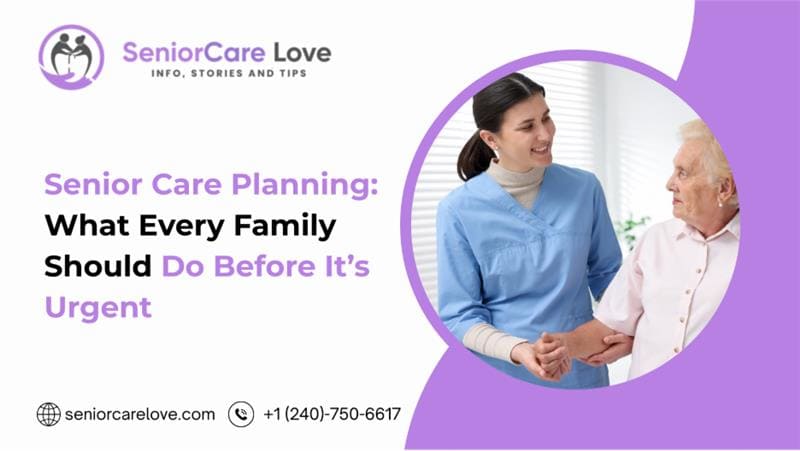There’s a peculiar truth about caregiving: it’s both the hardest and most heart-expanding thing a person can do—kind of like parenthood, but with more pill sorters and fewer participation trophies.
We’ve heard stories from families all over Maryland and DC. Stories that start with good intentions and Google searches and end with laughter, tears, or occasionally, someone locked out of the house while holding a casserole. (It happens more than you’d think.)
So today, we’re sharing a few of our favorite caregiver stories—real, unfiltered, and a little bit ridiculous—because sometimes, the only way to survive caregiving is to laugh right through it.
The Midnight Medication Mix-Up
Let’s start with The Call. Every caregiver has one—the one that jolts you awake and changes your relationship with caffeine forever.
For one daughter in Silver Spring, it came at 11:52 p.m.
Her mom—fiercely independent, mostly healthy, and deeply distrustful of childproof caps—had called to announce that she “might have taken Thursday’s pills on a Tuesday.” When asked how she knew, she said, “Because Wednesday’s compartment is empty too, dear.”
Cue panic. cue Dr. Google. cue the late-night pharmacy hotline that now knows them both by first name.
No one was harmed (thank you, mild vitamins). But they now keep a whiteboard on the fridge that reads: “Today is [insert day here].” And honestly, we might steal that idea for the office.
The Laugh Heard Round the Hallway
Then there’s Ms. Evelyn—a retired English teacher with dementia who loved two things: crossword puzzles and sarcasm.
Her caregiver, Maria, told us this: one day, Evelyn got frustrated trying to recall a word during breakfast. After a long pause, she turned to Maria and said, “You know, I used to be quite clever before all this nonsense.”
Without missing a beat, Maria smiled and said, “Still are. Just on a subscription plan now.”
They both burst out laughing.
That’s the thing about caregiving—it’s not all tears and tension. It’s also joy, humor, and grace, in five-minute bursts between chaos. It’s the ability to find light in the most ordinary mornings.
The Great Shower Rebellion
Every caregiver dreads one phrase: “I don’t need a shower.”
One of our clients in DC—a kind, patient son named Ravi—faced this every Sunday with his father. Dad insisted showers were for “special occasions.” Ravi tried coaxing, bribing, reasoning, and finally resorted to humor.
He said, “Well, it’s Sunday. The Lord would want you fresh.”
His father grumbled but got in the shower. From then on, they called it “Church Bath Day.” They still laugh about it.
Moral of the story? Creativity saves relationships. And sometimes hygiene.
Why We Keep Sharing These Stories
Because in a world full of checklists, caregiving gets reduced to logistics: meds, meals, mobility, medical charts. But those aren’t the moments you remember.
You remember the way your mom lights up when you play her wedding song. The smell of soup that feels like safety. The phone calls that go from urgent to hilarious in sixty seconds.
That’s what caregiving is: a messy, unpredictable love story.
Yes, there’s frustration. There’s burnout. There’s guilt. But there’s also laughter—the kind that sneaks up on you and reminds you you’re still human in the middle of it all.
How Caregivers Keep Going
Every caregiver we’ve met has their secret survival tools.
Some swear by yoga or prayer. Others keep snack stashes that would make Costco jealous. And many rely on small rituals—a morning walk, a favorite playlist, a nightly cup of tea before collapsing into bed.
But most of all? They rely on community.
Whether it’s a neighbor who drops off dinner, a support group, or a caregiving advisor (yes, that’s us)—it takes a village. A village with humor, heart, and a shared understanding that “self-care” isn’t selfish; it’s maintenance.
Personal Observation: The Caregiver Who Forgot Herself
We once worked with a caregiver named Judith—an only child caring for her mother with Parkinson’s. She handled everything: appointments, groceries, medications, even cutting her mom’s hair.
When we asked how she was doing, she said, “I’m fine.” (Translation: absolutely not fine.)
One day, we stopped by during a home visit and noticed a brand-new yoga mat in the corner. She laughed when we asked about it. “I bought it six months ago,” she said. “It’s been holding up the mail ever since.”
By the next month, she’d joined a local caregiver support group. When we asked why, she said, “Because I realized I’m part of this story too.”
That line stuck with us.
Because she’s right. Caregiving isn’t just about the person receiving care—it’s about the person giving it. And both deserve to be seen.
The Hard Truths and the Hidden Joys
Caregiving changes you. It demands patience you didn’t know you had and courage you didn’t sign up for. it teaches you about vulnerability—yours and theirs.
It also reminds you that life doesn’t stop being funny just because it’s hard.
A caregiver once told us, “If I didn’t laugh, I’d cry—and honestly, sometimes I do both.”
That’s the duality of caregiving: laughter through exhaustion, joy through sorrow, love through logistics.
And maybe that’s the most honest kind of love there is.
Final Thought: The Sound of Love
At Senior Care Love, we’ve heard hundreds of caregiver stories. Some make us cry. Some make us laugh so hard we nearly snort coffee. All remind us of one simple truth: caregiving is love in its loudest, messiest form.
It’s the love that wakes you at midnight to answer the phone. The love that makes you reheat soup three times because they “weren’t hungry” (until they were). The love that learns patience, humor, and grace—over and over again.
So here’s to the caregivers: the unsung heroes, the midnight med-trackers, the laughter-makers, the glue that holds families (and pill organizers) together.
May your coffee be strong, your Wi-Fi stable, and your pharmacy on speed dial.
And remember—when in doubt? Love harder. Laugh often. And call us. We’ve been there too.
Need a hand finding support, respite care, or just someone who gets it?
Reach out to Senior Care Love today. We’ll help you find not just care—but community.
FAQs: For Every Caregiver Who’s Just Trying to Keep It Together
Q: How do I avoid burnout as a caregiver?
A: You can’t avoid it completely—but you can manage it. Schedule real breaks (not “I’ll rest after the laundry”), accept help, and consider respite care. You can’t pour from an empty cup—or even a half-drained mug.
Q: Is it normal to feel frustrated or resentful sometimes?
A: 100% yes. You’re human, not a robot. Feeling tired, angry, or guilty doesn’t mean you don’t love your person—it means you’re stretched. Forgive yourself daily.
Q: What’s the best way to handle late-night medical calls or emergencies?
A: Have a plan ready: key contacts, medication list, and hospital preferences. Keep it visible and accessible. And remember, calling for help doesn’t mean you’ve failed—it means you’re doing your job well.
Q: How can humor help in caregiving?
A: Humor disarms fear, diffuses tension, and restores connection. It’s a built-in coping mechanism for survival. Use it liberally (and appropriately).







